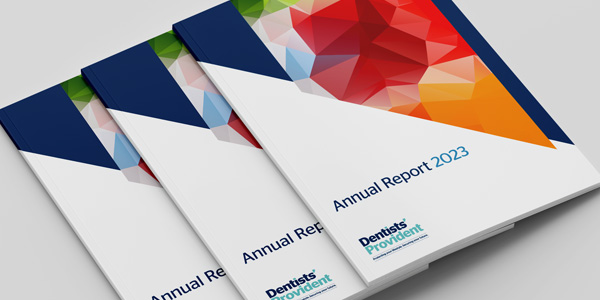
As a dental professional you are fully aware that pressure is part of the job and that those feelings of pressure and stress may be there from the start to the end of your career.
Of course, there are different ways to deal with stress, some more detrimental than others. For example, the reliance on over-the-counter painkillers, alcohol, prescription or even illegal drugs might seem like the only real option at the time, but these have their own dangers and potential long-term repercussions to your physical and mental health. Given this, it’s obvious that prevention is the best and first place to start, and then knowing how to more positively manage any symptoms of stress. Acquiring tools early on that can help you manage any new issues as they arise is essential and can help you avoid turning to these unhealthy solutions that could be damaging to your health and ultimately your career.
Introduction
Increasing levels of stress can have a significant and detrimental impact on your mental health. We are now fortunately in a position where discussing mental health issues publicly is more commonplace and acceptable, aided in part by the number of celebrities and public figures openly sharing their mental health stories. This is unequivocally good news for the millions who also suffer, especially those who in the past would likely have done so in silence. In fact, one in four people in the UK will experience mental health problems each year, and one in six in England report such common issues as anxiety or depression in any given week. According to MIND (the UK’s leading mental health charity), mental health issues are varied and include anger, anxiety, loneliness, stress, seasonal affective disorder (SAD) and self-esteem issues. With so many commonly-encountered issues impacting on our mental health, it’s essential that we recognise and deal with them as early as possible, and in the right way.
Highlighting the extent of the problem even further, the independent Mental Health Taskforce, formed in 2015, brought together healthcare leaders to produce a five year forward plan for mental healthcare in the NHS in England. They reported in their first year that £105 billion was being lost by the UK economy annually as a result of mental health problems; a sum similar to the total annual cost of the entire NHS.
Mental health issues in the medical professional, and specifically dental professionals, are well documented; many of the ‘top 10 lists’ of the UK’s most stressful jobs include dentistry and the Office of National Statistics (ONS) in 2017 stated that dentists, amongst a small number of other professions, had an increased risk of suicide.
Mental health issues can present themselves from a young age and there are a number of studies that have documented the pressure dental students are under. One recent study noting the high occurrence of depression, anxiety and stress. If not recognised and dealt with, once in a dental practice, regulation, patient expectations and the fear of being sued could cause a perfect storm of further stress. Following a path of increased stress, dental professionals could find themselves turning to a self-prescription of drugs and/or alcohol to cope, risking further mental and/or physical ill health that could, over time, lead to early retirement.
The facts
Every year around 15% of all claims paid to dentists by Dentists’ Provident are for psychiatric disorders and last year nearly £275,000 was paid in response to claims for stress and anxiety. Examples of recent claims include a dentist in their early 30s who experienced work related stress and an older member who began suffering from depression as a result of selling their practice. Dentists’ Provident supported both of them for nearly three months before they could return to work.
When things go wrong
Many of us reach for a glass of wine at the end of a stressful week to relax and unwind, or rely on over-the-counter pain relief to relieve a tension headache, but relying on alcohol or drugs (whether legal or otherwise) as a form of stress management could be slippery slope to addiction. Various surveys focusing on dental professionals and their use of alcohol have suggested that over a third of dentists use alcohol as a stress management tool and around ten percent medication of one form or another. And in the BDJ survey of ‘stress in dentists’ reported in January this year, over 85% had drunk alcohol in the last 12 months and around a fifth reported drinking four times or more a week, with over five per cent drinking every day.
A dentist interviewed in ‘The Dentist’ and ‘BDJ in practice’ last summer described her story. “I was viewed as successful on the outside. I worked in a great profession, had a lovely family and everything going for me, but to me I felt like a failure. The more I felt like a failure, the more I tried to prove I wasn’t and subsequently the more I drank…I didn’t realise that what I was experiencing was burnout… We sometimes feel as healthcare professionals that we should be solving our own healthcare issues, especially around mental health. First and foremost we are human and with just as much need for support as anyone else.”
Addiction is a neurological process, your brain starts to expect and enjoy the surge of chemicals, and this reaction to the dopamine encourages us to do it again and again, and it becomes a coping mechanism. Your brain remembers that positive reaction and it is this relationship with the stimuli used, and the triggers for it, rather than how much of it you are having that causes the repetition activity associated with addiction. This addictive process has been shown to affect dentists more than three times more than the general population.
Burnout in the dental profession
One of the consequences of chronic stress is professional burnout. Burnout is defined by you exhibiting three characteristics; mental or emotional exhaustion; a negative, indifferent or cynical attitude towards colleagues or patients and a feeling of being dissatisfied with your achievements, basically feeling negative about yourself. It can be described as ‘a gradual erosion of a person’, and each of these traits should be recognised in turn to prevent further damage. A study in the BDJ in 2008 noted that dentists with postgraduate qualifications and those in larger teams were more engaged with their work and had lower ‘burnout scores’, whereas those working in the NHS had higher levels of burnout.
Prevention and solutions
Some dental professionals support pro-active techniques that can offer stress prevention and control, such as yoga, the Alexander Technique, meditation and mindfulness. How you choose to deal with feeling overwhelmed or stressed with life and work, however, can be very personal; taking the dog for a walk, going for a run, having a relaxing bath, reading a book, listening to music or getting more sleep are all more healthy and tried and tested routes. But when things aren’t working so well and you realise you are turning to more negative coping mechanisms that are, or could be, on a road to addiction, you know only too well that you have to start intervening. If you visit a GP they may suggest a more active approach, some prescribing anti-depressive drugs (unless it is these causing you the problem), while others may recommend the NHS approved Cognitive Behavioural Therapy (CBT). If they have concerns towards your misuse of drugs or alcohol, they will usually prescribe a specific course of action for you after discussions and screening tests to decide if you are at risk of harm.
The NHS describes CBT as ‘a talking therapy that can help you manage your problems by changing the way you think and behave. It's most commonly used to treat anxiety and depression, but can be useful for other mental and physical health problems.’ CBT is highly structured and needs the complete commitment of the participant to effectively deal with the issue at hand.
Trevor Collins, a clinical hypnotherapist, said “What you choose to do and what works for you can be very personal, and talk therapies such as CBT are very useful, as talking about an issue, whether it is to a friend, family member or therapist, in itself, can be very therapeutic. The advantage of talking to a professional and stranger is the chance for objectivity, without opinion, within a more structured framework for your thought processes. It can be very valuable for you to be assisted in seeing things from a different point of view and putting it into perspective.”
The BDA can also provide help. Plus there is The Dentists’ Health Support Programme and the British Doctors and Dentists Group as well as a Facebook group called ‘A group for Dentists in Crisis’, so support is there if you feel you need it.
Taking the time to step back and review how you feel and react to external events, or noticing any out of character behavioural changes exhibited by your colleagues, could be an observation that ends up being career saving for you or them.
References available on request.
This article is intended for general information only, it is not designed to provide financial, health or other advice, nor is it intended to make any recommendations regarding the suitability of any plans for any particular individual. Nothing in this article constitutes an invitation, inducement or offer to subscribe for membership or additional benefits of Dentists’ Provident.
No responsibility or liability is assumed by Dentists’ Provident or any copyright owner for any injury or damage to persons or property as a consequence of the reading, use or interpretation of its published content. Whilst every effort is made to ensure accuracy, Dentists’ Provident, the authors, Editors and copyright owners cannot be held responsible for published errors.
Dentists’ Provident exercises editorial control only over material published and/or produced by it. No responsibility or liability is assumed by Dentists’ Provident for any articles produced or reproduced in third party publications and/or websites.
The views or opinions expressed do not necessarily reflect views of Dentists’ Provident or copyright owners. Inclusion of any advertising material does not constitute a guarantee or endorsement of any products or services or the claims made by any manufacturer.
If you have any questions, please contact our member services consultants by emailing press@dentistsprovident.co.uk or calling 020 7400 5710.
If you have any questions, please contact our member services consultants by emailing
memberservices@dentistsprovident.co.uk or calling 020 7400 5710.

Our 2024 Annual General Meeting will be held at 91-94 Saffron Hill, London, EC1N 8QP on Friday 24th Ma…
Read more
The 2023 annual report from Dentists’ Provident, a leading income protection provider for dental profe…
Read more
Our next exhibition is the British Dental Conference & Dentistry Show in May, where we look forward to meeting anyone interested in becoming a member or members wanting to discuss their plans.